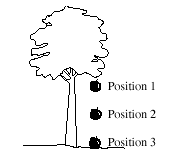Thanks for the help.
I found several sources with answer keys and they seem correct. Here is another one that explains it for the first one:
https://www.uv.uio.no/ils/forskning/prosjekt-sider/timss-norge/TIMSS/1995/art_ex_population.pdf
The next item (see Figure 4) is about an apple falling to the ground
due to gravity, a concept that is far from easy. Gravity acts on the apple
whether it is falling or not, regardless of position and movement.
However, when the apple is resting on the ground there is also a force
from the ground pointing upwards. The force of gravity and this force
from the ground have the same size, and the apple is at rest because
the sum of forces is zero. If we neglect the air resistance, only gravity
acts on the apple when it is falling.
Students’ understanding of mechanics is probably the domain within
physics that is most frequently explored by science educators. Many
such studies show that students in all age groups all over the world have
unsatisfactory understanding of simple but crucial topics of mechanics.
And often, the students’ ideas and concepts have been shown to be
surprisingly similar in many countries (Duit & Treagust, 1995). Looking
at Table 5 we see that this item shows remarkably good results.
Perhaps all the attention connected to this research has had a positive
influence on teaching and learning around the world.
K17. The drawing shows an apple falling to the ground. In
which of the three positions does gravity act on the apple?
A. 2 only
B. 1 and 2 only
C. 1 and 3 only
D. 1, 2, and 3
Figure 4. Item K17
The response patterns are quite similar across groups of countries, the
between group part of the pooled variance amounting to only about 25
percent. More than 60 percent correct responses in East Asia
represents a very satisfactory result, and all the countries within this
group score above the international average. However, there are large
differences between some countries within groups, East and South
Europe in particular. For example in East Europe, the Czech Republic
has 81percent correct while Russia has only 42 percent correct and 41
percent for distractor B. Furthermore, in South Europe Spain has 55
percent correct compared to Greece with 30 percent correct and 49
percent for distractor B.
The most common incorrect response is B, which indicates the belief
that gravity acts only when the apple is falling. Distractor A most likely
indicates the same belief. (It is however, not entirely clear if the apple in
Position 1 is moving or not). The international mean response frequency
is 34 percent for these two alternatives together. The conception that
gravity acts only when the effect is observable, is known to be a
common misconception. As diSessa (1993) says, according to many
students’ views only the movement needs to be explained, and gravity
provides this explanation in the form of a “moving force.” Forces are
therefore comprehended as cause for movement and not as cause for
changes of the movement (Sjøberg & Lie 1981).
On the other hand, those students who choose C (Figure 4) may
think that forces only act when the apple is at rest and no forces act on
the falling apple in Position 2. Something similar appears when we are
talking about weightlessness. When an astronaut is so-called
“weightless,” gravity is acting on both the spaceship and the astronaut.
There are however, no forces acting between them, and therefore the
astronaut has this feeling of weightlessness. It is when we are at rest on
the ground we “feel” our weight. This may explain some students’
response to this item. In some countries almost 20 percent chose C, e.g.
Iceland, Latvia, and South Africa.






